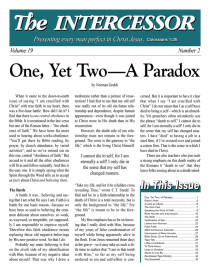
Tape Talk
TAPE REVIEW:
Rees Howells
by Norman Grubb
except a corn of wheat fall into the ground and die, it abideth alone: but if it die, it bringeth forth much fruit. Taking his Saviors words to heart, Rees Howells lived this with every fiber of his being, oftentimes to the dismay and disapproval of onlookers.
Norman Grubb spoke of two men of great influence in his life. In the previous issue of The Intercessor, we saw one: C.T. Studd, and now we will see the other: Rees Howells. Norman said of Rees that he lived a Holy Spirit life and had something that Norman had not met before in evangelical circles (with the exception of C.T.). He was at ease, natural, free, and hospitable. At the same time, he was unyielding on something that he believed God had said to him. Rees, like C.T., had that founders complexion.
Many of us have read the account of his life in Normans biography, Rees Howells, Intercessor, but it is thrilling to hear the stories in Normans own words on tape. In the Bible College of Wales that he founded, they would gather nightly to hear him expound on the men of faith in the Bible, and then learn of the practical applications in their own lives.
Rees all-consuming passion in life was intercession, from the first giving up of his life for a woman with consumption (tuberculosis), on to his final great intercession as he led the teachers and students at the College to battle through World War II. As I have looked back at the events of those years, it has changed my outlook of world history. Here was a small company of Christians, led by Rees Howells, knowing by faith how God was dealing with the dictators and tyrants that threatened our whole civilization. Battle by battle they prayed and believed God would turn the tide, and break the back of the enemy. Rees reputation was shattered as he predicted the end of the war by Whit Sunday (May 12, 1940). Rather than see the end, the war intensified through France, with Holland and Belgium falling to Hitler, and England narrowly escaping invasion. Undaunted by his outer death, Rees stuck by his word, as he watched God work out the total destruction of Hitler (which had to be so he could not rise again).
Norman, describing Rees final great burdenGod will destroy Hitler and Mussolini; theyre interfering with the spread of the gospel. Two very grave concerns of his were that the gospel not be stopped and the Holy Land not be touched. Norman declares the results of this intercession, Since then the world has never seen anything like ittheres never been such a spread of the gospel; and The Holocaust stiffened people up to get the Holy Land back to Israel. It stirred the world vote in the United Nations to have Israel again (the first time Russia abstained in the Security Council).
During the years between Rees first intercession and his all-encompassing final one were many examples of his faith. Norman tells of the buying of the estates of which the Bible College was comprised. On one occasion a Major Pratt who owned one place, Sketty Isaf, when learning that Rees Howells wanted to buy it, said jokingly that he better get out, which he did. It is thrilling to hear Normans enthusiasm as he details how God gave Rees the estates as the needs of the College arose. But each account was a product of intercession, which always involves a death to the person carrying the burden.
As you read this, my hope is that this not only sparks your interest in listening to Normans personal account of Rees Howells, but also encourages you to read his life story, Rees Howells, Intercessor, and ultimately see how this is Gods battle call for each of us today.





